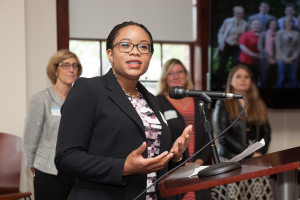Hussman School doctoral alumna Diane Francis '16 (PhD) receives 2017 GEAB Impact Award

Story by the UNC Graduate School
Originally published on gradschool.unc.edu
The Graduate School's annual Graduate Education Advancement Board Impact Awards recognize graduate students for contributions they are making to our state. These awards are possible thanks to the unwavering support of the Graduate Education Advancement Board.
The longstanding GEAB Impact Award recognizes discoveries with a direct impact on our state in the present time. New for 2017, the Horizon Award recognizes discoveries with future potential to benefit North Carolina (and beyond).
The Role of Messaging in Reducing STI Transmission
Diane Francis, Media and Journalism
GEAB Impact Award
Women account for almost 25 percent of new HIV infections in North Carolina, with African-American women representing 71 percent of those diagnoses, according to the N.C. Department of Health and Human Services. Condoms can prevent transmission of HIV and other sexually transmitted infections. Yet young women, in particular, may experience embarrassment when accessing condoms. To improve condom access for young African-American women, Diane Francis, Ph.D., evaluated an innovative condom distribution and health communication initiative. Due to the focus on young African-American women, the study took place at an all-women's historically black college/university (HBCU) in the state.
Dispensers featuring targeted safer sex messages were installed in dormitory bathrooms across the HBCU campus. The UNC-Chapel Hill Center for AIDS Research funded the initiative; project members were co-principal investigators Francis and Seth Noar, Ph.D., of UNC-Chapel Hill and co-investigator Deborah Fortune, Ph.D., of North Carolina Central University. Prior to launching the initiative, the team conducted extensive research to develop the messages that were placed on the dispensers.
Surveys were collected immediately before and three months after the dispensers were installed. Follow-up interviews also explored how students felt about the dispensers and messages. The initiative was found to improve perceptions of condom access and to support safer sex behaviors. The college plans to continue the campus program, even though the study has ended. Francis' research demonstrates the effectiveness of initiatives combining health communication and condom distribution toward the goal of reducing HIV/STI transmission in North Carolina.
"Diane's deep commitment to this project made it so successful. I am proud that her study not only contributed to the science in this area, but also changed the safer sex climate on a college campus in ways that will prevent AIDS and other STDs," said adviser Seth Noar, Ph.D.